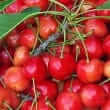Background
- Cherries have been used as both food and medicine. African cherry (Prunus africana) has been used to treat enlarged prostate and other disorders. Cherries contain polyphenols, which may have antioxidant, anticancer, and anti-inflammatory properties. However, there is limited scientific evidence to support these uses.
- Early study suggests that cherry may be able to relieve exercise-induced muscle damage, but larger studies are needed before a strong recommendation can be made.
- Cherries appear to be highly allergenic. There are many reports of sensitivity to cherries and cross-reactivity with other plants. People who are allergic to birch pollen may also be sensitive to cherries.
References
Natural Standard developed the above evidence-based information based on a thorough systematic review of the available scientific articles. For comprehensive information about alternative and complementary therapies on the professional level, go to . Selected references are listed below.
- Alexander P, Walters A, Verghese G. Cherry pip bezoars causing acute small intestinal obstruction presenting as diabetic ketoacidosis. Indian J Gastroenterol. 2005;24(6):273-274.
View Abstract - Connolly DA, McHugh MP, Padilla-Zakour OI, et al. Efficacy of a tart cherry juice blend in preventing the symptoms of muscle damage. Br J Sports Med. 2006;40(8):679-683.
View Abstract - Fuchs HC, Bohle B, Dall'Antonia Y, et al. Natural and recombinant molecules of the cherry allergen Pru av 2 show diverse structural and B cell characteristics but similar T cell reactivity. Clin Exp Allergy. 2006;36(3):359-368.
View Abstract - Jacob RA, Spinozzi GM, Simon VA, et al. Consumption of cherries lowers plasma urate in healthy women. J Nutr. 2003;133(6):1826-1829.
View Abstract - Jahn-Schmid B, Radakovics A, Luttkopf D, et al. Bet v 1142-156 is the dominant T-cell epitope of the major birch pollen allergen and important for cross-reactivity with Bet v 1-related food allergens. J Allergy Clin Immunol. 2005;116(1):213-219.
View Abstract - Kang SY, Seeram NP, Nair MG, et al. Tart cherry anthocyanins inhibit tumor development in Apc(Min) mice and reduce proliferation of human colon cancer cells. Cancer Lett. 2003;194(1):13-19.
View Abstract - Kelley DS, Rasooly R, Jacob RA, et al. Consumption of Bing sweet cherries lowers circulating concentrations of inflammation markers in healthy men and women. J Nutr. 2006;136(4):981-986.
View Abstract - Mittermair RP, Gruber H, Kafka-Ritsch R. Cherry pit ingestion leading to diagnosis of colon carcinoma. Am J Surg. 2004;188(2):185.
View Abstract - Pastorello EA, Farioli L, Pravettoni V, et al. Identification of grape and wine allergens as an endochitinase 4, a lipid-transfer protein, and a thaumatin. J Allergy Clin Immunol. 2003;111(2):350-359.
View Abstract - Reddy MK, Alexander-Lindo RL, Nair MG. Relative inhibition of lipid peroxidation, cyclooxygenase enzymes, and human tumor cell proliferation by natural food colors. J Agric Food Chem. 11-16-2005;53(23):9268-9273.
View Abstract - Reuter A, Lidholm J, Andersson K, et al. A critical assessment of allergen component-based in vitro diagnosis in cherry allergy across Europe. Clin Exp Allergy 2006;36(6):815-823.
View Abstract - Schehl B, Lachenmeier D, Senn T, et al. Effect of the stone content on the quality of plum and cherry spirits produced from mash fermentations with commercial and laboratory yeast strains. J Agric Food Chem. 2005;53(21):8230-8238.
View Abstract - Scheurer S, Lauer I, Foetisch K, et al. Strong allergenicity of Pru av 3, the lipid transfer protein from cherry, is related to high stability against thermal processing and digestion. J Allergy Clin Immunol. 2004;114(4):900-907.
View Abstract - Stewart KM. The African cherry (Prunus africana): can lessons be learned from an over-exploited medicinal tree? J Ethnopharmacol. 2003;89(1):3-13.
View Abstract - Yamaguchi K, Liggett JL, Kim NC, et al. Anti-proliferative effect of horehound leaf and wild cherry bark extracts on human colorectal cancer cells. Oncol Rep. 2006;15(1):275-281.
View Abstract







